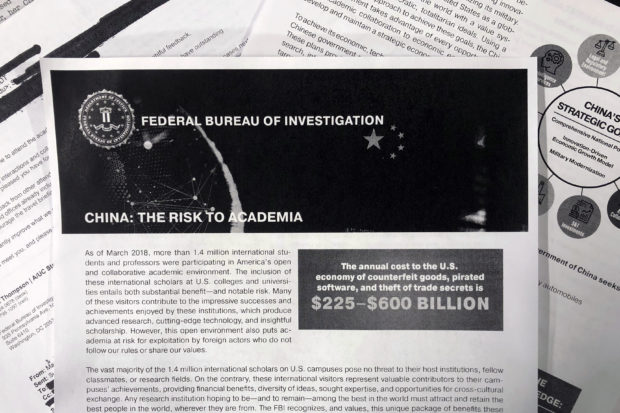US researchers on front line of battle against Chinese theft
WASHINGTON – As the U.S. warned allies around the world that Chinese tech giant Huawei was a security threat, the FBI was making the same point quietly to a Midwestern university.

This Oct. 4, 2019 photo shows a copy of an FBI pamphlet and related emails. The FBI’s outreach to American colleges and universities about the threat of economic espionage includes this pamphlet that warns specifically about efforts by China to steal academic research. (AP Photo)
In an email to the associate vice chancellor for research at the University of Illinois-Urbana-Champaign, an agent wanted to know if administrators believed Huawei had stolen any intellectual property from the school.
Told no, the agent responded: “I assumed those would be your answers, but I had to ask.”
It was no random query.
The FBI has been reaching out to universities across the country as the U.S. tries to stem what American authorities portray as the wholesale theft of technology and trade secrets by researchers tapped by China. The breadth and intensity of the campaign emerges in emails obtained by The Associated Press through records requests to public universities in 50 states.
Agents have lectured at seminars, briefed administrators in campus meetings and distributed pamphlets with cautionary tales of trade secret theft. In the past two years, they’ve requested emails of two University of Washington researchers, asked Oklahoma State University if it has scientists in specific areas and asked about “possible misuse” of research funds by a University of Colorado Boulder professor, according to the emails.
The emails reveal administrators routinely requesting FBI briefings. But they also show some struggling to balance legitimate national security concerns against their own eagerness to avoid stifling research or tarnishing legitimate scientists. The Justice Department says it appreciates that push-pull and wants only to help separate the relatively few researchers engaged in theft from the majority who are not.
Senior FBI officials told AP they’re not encouraging schools to monitor researchers by nationality but instead to take steps to protect research. They consider the briefings vital since they say universities haven’t historically been as attentive to security as they should be.
“When we go to the universities, what we’re trying to do is highlight the risk to them without discouraging them from welcoming the researchers and students from a country like China,” said Assistant Attorney General John Demers, the Justice Department’s top national security official.
The threat, officials say, is genuine. A University of Kansas researcher was recently charged with collecting federal grant money while working full-time for a Chinese university, and a Chinese government employee was arrested in a visa fraud scheme allegedly aimed at recruiting U.S. research talent. The Justice Department launched last year an effort called the China Initiative aimed at identifying priority trade secret cases and focusing resources on them.
“Existentially, we look at China as our greatest threat from an intelligence perspective, and they succeeded significantly in the last decade from stealing our best and brightest technology,” said top U.S. counterintelligence official William Evanina.
The most consequential case this year centered not on a university but on Huawei, charged with stealing corporate trade secrets and evading sanctions. The company denies wrongdoing. Several universities including Illinois, which received the FBI email last February, have begun severing ties with Huawei.
But the government’s track record hasn’t been perfect.
Federal prosecutors in 2017 dropped charges against a Temple University professor earlier accused of sending designs for a pocket heater to China. The professor, Xiaoxing Xi, is suing the FBI. “It was totally wrong,” he said, “so I can only speak from my experience that whatever they put out there is not necessarily true.”
Richard Wood, the then-interim provost at the University of New Mexico, conveyed ambivalence in an email to colleagues last year. He wrote that he took seriously the concerns the FBI had identified to him in briefings, but also said “there are real tensions” with the “traditional academic norms regarding the free exchange of scientific knowledge wherever appropriate.”
“I do not think we would be wise to create new ‘policy’ on terrain this complex and fraught with internal trade-offs between legitimate concerns and values without some real dialogue on the matter,” Wood wrote.
FBI officials say they’ve received consistently positive feedback from universities. The emails show administrators at schools including the University of North Carolina-Chapel Hill and Nebraska requesting briefings, training or generally expressing eagerness for cooperation.
Kevin Gamache, chief research security officer for the Texas A&M University system, told the AP that he values his FBI interactions and that it flows in both directions.
“It’s a dialogue that has to be ongoing.”
The vice president for research and economic development at the University of Nevada, Las Vegas welcomed the assistance in a city she noted was the “birthplace of atomic testing.
“We have a world-class radiochemistry faculty, our College of Engineering has significant numbers of faculty and students from China, and we have several other issues of concern to me as VPR. In all of these cases, the FBI is always available to help,” the administrator wrote to agents.
More than two dozen universities produced records, including symposium itineraries and a 13-page FBI pamphlet titled “China: The Risk to Academia” that warns that China does “not play by the same rules of academic integrity” as American universities.
Some emails show agents seeking tips or following leads.
“If you have concerns about any faculty or graduate researchers, students, outside vendors … pretty much anything we previously discussed — just reminding you that I am here to help,” one wrote to Iowa State officials in 2017.
In May, an agent sent the University of Washington a records request for two researchers’ emails, seeking references to Chinese-government talent recruitment programs. /gsg